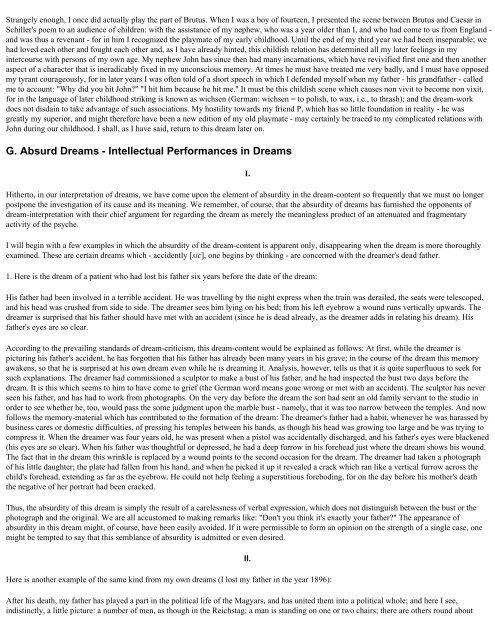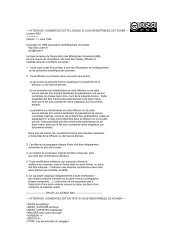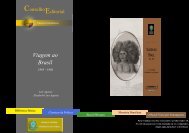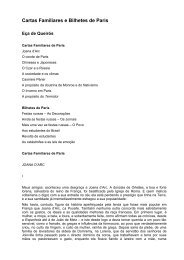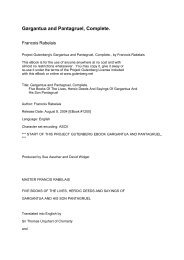The Interpretation of Dreams Sigmund Freud (1900)
The Interpretation of Dreams Sigmund Freud (1900)
The Interpretation of Dreams Sigmund Freud (1900)
Create successful ePaper yourself
Turn your PDF publications into a flip-book with our unique Google optimized e-Paper software.
Strangely enough, I once did actually play the part <strong>of</strong> Brutus. When I was a boy <strong>of</strong> fourteen, I presented the scene between Brutus and Caesar in<br />
Schiller's poem to an audience <strong>of</strong> children: with the assistance <strong>of</strong> my nephew, who was a year older than I, and who had come to us from England -<br />
and was thus a revenant - for in him I recognized the playmate <strong>of</strong> my early childhood. Until the end <strong>of</strong> my third year we had been inseparable; we<br />
had loved each other and fought each other and, as I have already hinted, this childish relation has determined all my later feelings in my<br />
intercourse with persons <strong>of</strong> my own age. My nephew John has since then had many incarnations, which have revivified first one and then another<br />
aspect <strong>of</strong> a character that is ineradicably fixed in my unconscious memory. At times he must have treated me very badly, and I must have opposed<br />
my tyrant courageously, for in later years I was <strong>of</strong>ten told <strong>of</strong> a short speech in which I defended myself when my father - his grandfather - called<br />
me to account: "Why did you hit John?" "I hit him because he hit me." It must be this childish scene which causes non vivit to become non vixit,<br />
for in the language <strong>of</strong> later childhood striking is known as wichsen (German: wichsen = to polish, to wax, i.e., to thrash); and the dream-work<br />
does not disdain to take advantage <strong>of</strong> such associations. My hostility towards my friend P, which has so little foundation in reality - he was<br />
greatly my superior, and might therefore have been a new edition <strong>of</strong> my old playmate - may certainly be traced to my complicated relations with<br />
John during our childhood. I shall, as I have said, return to this dream later on.<br />
G. Absurd <strong>Dreams</strong> - Intellectual Performances in <strong>Dreams</strong><br />
Hitherto, in our interpretation <strong>of</strong> dreams, we have come upon the element <strong>of</strong> absurdity in the dream-content so frequently that we must no longer<br />
postpone the investigation <strong>of</strong> its cause and its meaning. We remember, <strong>of</strong> course, that the absurdity <strong>of</strong> dreams has furnished the opponents <strong>of</strong><br />
dream-interpretation with their chief argument for regarding the dream as merely the meaningless product <strong>of</strong> an attenuated and fragmentary<br />
activity <strong>of</strong> the psyche.<br />
I will begin with a few examples in which the absurdity <strong>of</strong> the dream-content is apparent only, disappearing when the dream is more thoroughly<br />
examined. <strong>The</strong>se are certain dreams which - accidently [sic], one begins by thinking - are concerned with the dreamer's dead father.<br />
1. Here is the dream <strong>of</strong> a patient who had lost his father six years before the date <strong>of</strong> the dream:<br />
His father had been involved in a terrible accident. He was travelling by the night express when the train was derailed, the seats were telescoped,<br />
and his head was crushed from side to side. <strong>The</strong> dreamer sees him lying on his bed; from his left eyebrow a wound runs vertically upwards. <strong>The</strong><br />
dreamer is surprised that his father should have met with an accident (since he is dead already, as the dreamer adds in relating his dream). His<br />
father's eyes are so clear.<br />
I.<br />
According to the prevailing standards <strong>of</strong> dream-criticism, this dream-content would be explained as follows: At first, while the dreamer is<br />
picturing his father's accident, he has forgotten that his father has already been many years in his grave; in the course <strong>of</strong> the dream this memory<br />
awakens, so that he is surprised at his own dream even while he is dreaming it. Analysis, however, tells us that it is quite superfluous to seek for<br />
such explanations. <strong>The</strong> dreamer had commissioned a sculptor to make a bust <strong>of</strong> his father, and he had inspected the bust two days before the<br />
dream. It is this which seems to him to have come to grief (the German word means gone wrong or met with an accident). <strong>The</strong> sculptor has never<br />
seen his father, and has had to work from photographs. On the very day before the dream the son had sent an old family servant to the studio in<br />
order to see whether he, too, would pass the some judgment upon the marble bust - namely, that it was too narrow between the temples. And now<br />
follows the memory-material which has contributed to the formation <strong>of</strong> the dream: <strong>The</strong> dreamer's father had a habit, whenever he was harassed by<br />
business cares or domestic difficulties, <strong>of</strong> pressing his temples between his hands, as though his head was growing too large and be was trying to<br />
compress it. When the dreamer was four years old, he was present when a pistol was accidentally discharged, and his father's eyes were blackened<br />
(his eyes are so clear). When his father was thoughtful or depressed, he had a deep furrow in his forehead just where the dream shows his wound.<br />
<strong>The</strong> fact that in the dream this wrinkle is replaced by a wound points to the second occasion for the dream. <strong>The</strong> dreamer had taken a photograph<br />
<strong>of</strong> his little daughter; the plate had fallen from his hand, and when he picked it up it revealed a crack which ran like a vertical furrow across the<br />
child's forehead, extending as far as the eyebrow. He could not help feeling a superstitious foreboding, for on the day before his mother's death<br />
the negative <strong>of</strong> her portrait had been cracked.<br />
Thus, the absurdity <strong>of</strong> this dream is simply the result <strong>of</strong> a carelessness <strong>of</strong> verbal expression, which does not distinguish between the bust or the<br />
photograph and the original. We are all accustomed to making remarks like: "Don't you think it's exactly your father?" <strong>The</strong> appearance <strong>of</strong><br />
absurdity in this dream might, <strong>of</strong> course, have been easily avoided. If it were permissible to form an opinion on the strength <strong>of</strong> a single case, one<br />
might be tempted to say that this semblance <strong>of</strong> absurdity is admitted or even desired.<br />
Here is another example <strong>of</strong> the same kind from my own dreams (I lost my father in the year 1896):<br />
After his death, my father has played a part in the political life <strong>of</strong> the Magyars, and has united them into a political whole; and here I see,<br />
indistinctly, a little picture: a number <strong>of</strong> men, as though in the Reichstag; a man is standing on one or two chairs; there are others round about<br />
II.


